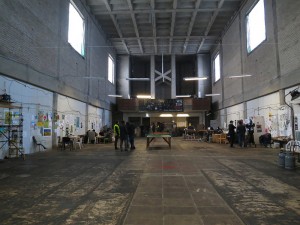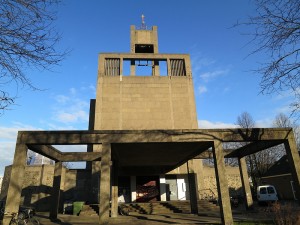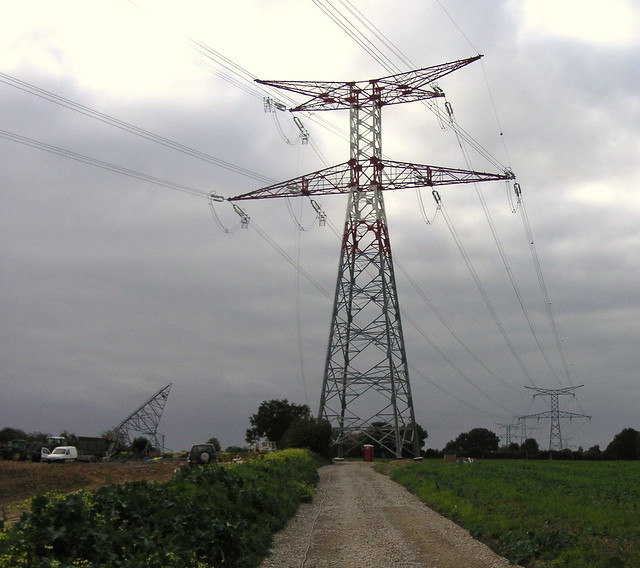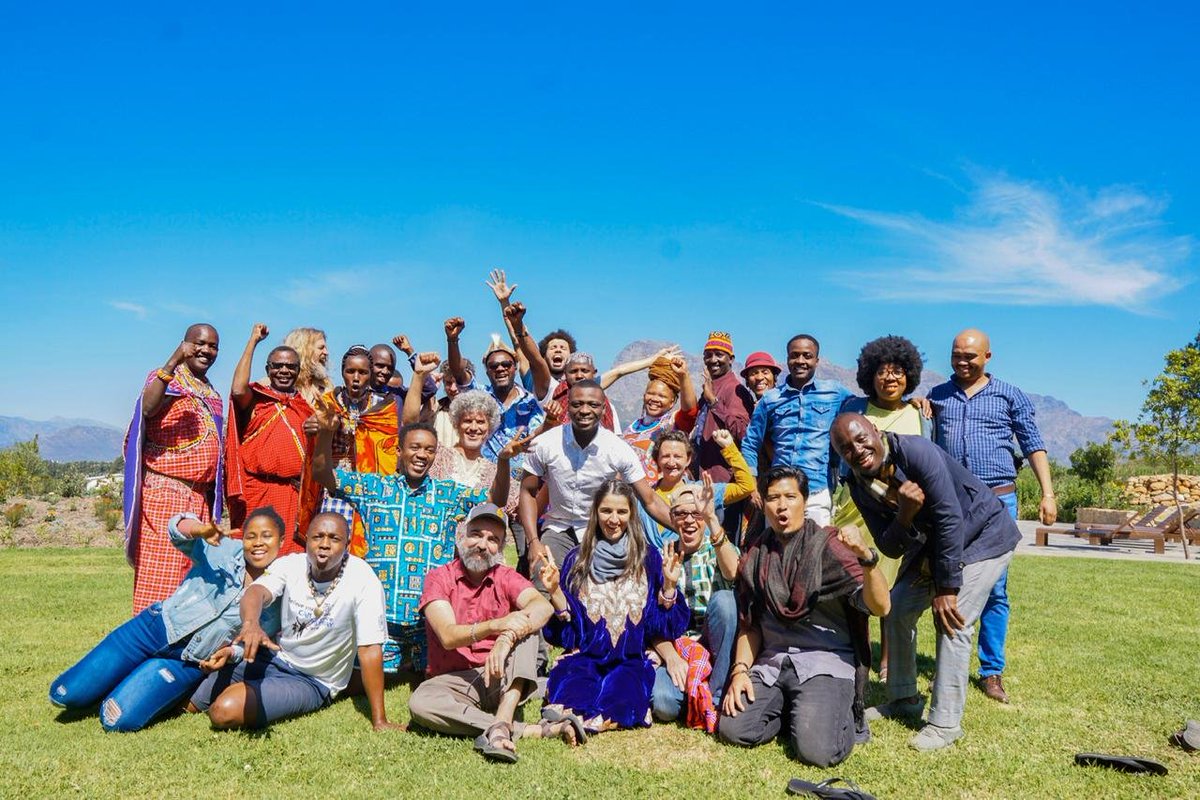This month I had the great honor of being present at the Video 4 Change gathering in South Africa. This meeting brought together indigenous activists from different parts of the continent, as well as allies and friends from the rest of the world. The topic: the struggle for indigenous rights in a globalized world where in the name of profit and development, people who have long lived in harmony with their environment are being forced to discard their identity and physically pulled from their ancestral land. How is this happening in an era of sustainable development goals and human rights? What can be done to help communities defend themselves and be heard on a national and international scale?
Tag Archives: struggle
Joana Ponder: Empowering, Reconnecting, and other Passion Projects
Joana Ponder has an approach to life that I greatly admire. She’s also a fun person to speak with. For these reasons and more I invited her to the kitchen table for a conversation about what she’s busy with when it comes to how we see ourselves and approach life through good times and bad.
Her Website. Her Podcast: The Pondercast
The Refugee Church of Amsterdam
At the beginning of this winter, as I prepared for the great journey to North Africa, here in Amsterdam I heard about a group of asylum seekers who were living in a tent camp somewhere in the city. Despite my preoccupation with my own plans, I was pleased to hear that many organizations and individuals that I know to be good at making things happen and finding solutions were involved. Then in early December I heard that after their tent camp was taken down by the authorities, with help from concerned citizens of Amsterdam, the refugees occupied an empty church not far from my neighborhood. They called it “De Vluchtkerk”, literally translated: “The Flight Church”, though I prefer to simply call it The Refugee Church.
After all my travels and everything else that has kept me busy these past few months, a few weeks ago I finally had the good fortune to be welcomed at the church and meet some of its residents.
 As I walked into this strange cement structure, I immediately noticed the chilling cold in the massive main hall. It felt almost colder than the wintery weather outside, which made it perfectly understandable that everyone I saw standing or sitting near the entrance was sporting a winter coat and warm hat. Near the door, a few Dutch volunteers look through paperwork and chat with a few residents. It feels like a routine day, a camera crew sits near a couch and have a laugh during what seems to be a long interview. At a make-shift computer lab consisting of 4 computers in one corner of the hall, several men seem captivated by whatever they are reading. As I look forward towards what used to be the alter of this defunct church, I see a man and two women preparing what will surely be dinner using their improvised kitchen setup. Every few minutes someone else walks out of one of the side doors which lead to dorm style sleeping areas behind what are clearly recently created plywood walls. Each door is decorated with signs and pictures, featuring text in English, French, and Arabic. Every time one person passes another they speak a quick “hello my brother” or “hello my sister”. I also try to get into it by nodding my head towards people who pass me, “good afternoon”, “salaam alaykum”, etc. The friendliness is contagious.
As I walked into this strange cement structure, I immediately noticed the chilling cold in the massive main hall. It felt almost colder than the wintery weather outside, which made it perfectly understandable that everyone I saw standing or sitting near the entrance was sporting a winter coat and warm hat. Near the door, a few Dutch volunteers look through paperwork and chat with a few residents. It feels like a routine day, a camera crew sits near a couch and have a laugh during what seems to be a long interview. At a make-shift computer lab consisting of 4 computers in one corner of the hall, several men seem captivated by whatever they are reading. As I look forward towards what used to be the alter of this defunct church, I see a man and two women preparing what will surely be dinner using their improvised kitchen setup. Every few minutes someone else walks out of one of the side doors which lead to dorm style sleeping areas behind what are clearly recently created plywood walls. Each door is decorated with signs and pictures, featuring text in English, French, and Arabic. Every time one person passes another they speak a quick “hello my brother” or “hello my sister”. I also try to get into it by nodding my head towards people who pass me, “good afternoon”, “salaam alaykum”, etc. The friendliness is contagious.
The group, which is now comprised of over 100 men and women from countries like Sudan, Somalia, Mauritania, and Eritrea, has become a tight-knit unit where everyone knows each other. I’m welcomed by Mouthena, who I had arranged a meeting with via telephone the day before. He is dressed in full winter gear and sports an uneven beard to go along with his obvious tiredness. “I’m sorry I’m probably looking very tired because its too cold to sleep these nights. Many of us just stay up all night with this cold,” he explains to me in French. Mouthena is Western Saharan, though no such country exists in the eyes of most of the world. The UN technically looks after the territory of Western Sahara and Morrocco exercises control over much of what happens there. Mouthena identifies himself as Polisario, the traditional name of the independence movement that has been largely outlawed by Morrocco despite being recognized by the UN. As a result of all the difficulties within the territory, Polisarios like Mouthena live most of their lives in refugee communities just over the border in Mauritania. As he pours me a cup of tea, he explains the difficulties of living in such a place, and the tribal conflict that became a threat to his life and caused him to flee to Europe.
Over the course of the next few hours, Mouthena explains what had been his goal to seek asylum in Sweden, the complicated journey and eventually getting apprehended on an international bus ride in Germany, where immigration sent him to the Netherlands, the country from where the bus originated. The details are captivating and frustrating, yet he explains it all with relative calmness, until he comes to parts that clearly make him upset. “I can’t tell you more of these details, they make me too sad. Not today. But I’ll tell you other things about this place and its people.”
 As we take a tour of the massive grey hall, every few steps he stops to greet a resident and introduce them. As I shake a very well dressed quiet man’s hand, Mouthena sings his praises, “This man is very talented. His name is Shirac, he is a singer-songwriter.” Sure enough I spot a poster on the wall with images from a concert by the “Vluchtkerk Band” and there he is on stage. Over in a side room we’re greeted by a stern, imposing African woman who is busy folding bed sheets with great gusto. Again Mouthena explains, “She is our mother. To all of us who don’t have mothers here. We call her our mother and she treats us like her children.” He sneaks a hug which the woman accepts gracefully.
As we take a tour of the massive grey hall, every few steps he stops to greet a resident and introduce them. As I shake a very well dressed quiet man’s hand, Mouthena sings his praises, “This man is very talented. His name is Shirac, he is a singer-songwriter.” Sure enough I spot a poster on the wall with images from a concert by the “Vluchtkerk Band” and there he is on stage. Over in a side room we’re greeted by a stern, imposing African woman who is busy folding bed sheets with great gusto. Again Mouthena explains, “She is our mother. To all of us who don’t have mothers here. We call her our mother and she treats us like her children.” He sneaks a hug which the woman accepts gracefully.
The stories become too many to communicate in one text, one interview, or one video. Thankfully one by one, several journalists and dedicated media makers have been recording and disseminating these stories over the past months. Many of them prominently found on the church’s website.
When this month ends, so too will the temporary agreement local activists made with the property owner to house the group. Always the resourceful types, the organization says the Refugee Church will come to an end but the group will continue its struggle with Dutch immigration authorities, to not be sent back to their home countries where death and despair await them. I ask several members of the group what they think will happen, a question which always earns the same response: “We don’t know. We are hopeful. But we never know. The only thing we want is to be able to live legally and in safety. And after this experience, it is now important to us that we stick together.” When Mouthena answers this question he adds his own twist, “You know, in our home countries we have many conflicts, borders, languages, all kinds of differences that separate us. Here we are one family. These are my brothers and sisters now.”
Progress Rumbles Through Your Yard

The lower Normandy that I’ve come to know is an amazing world of deep green fields, breathtaking skies, and a silence I have never heard before. The few houses you pass are modest and functional. They can be found between the long stretches of corn and the grazing land where content cows and sheep seem to have all the time in the world to eat and relax. One of the busiest metropoles in the world is 3 to 4 hours away, but out here it may as well be on another continent. Still, people here are busy, building things, cleaning things, working the land in one form or another. Some grew up here and continue a family tradition of agricultural work. Others come from different parts of the country, even foreign countries, to live the healthy, calm, and satisfyingly simple life they always wished for.
Looking out over the mystifying landscape one night, a friend shows me with great disappointment, massive new structures on the otherwise beautiful horizon. With their feet planted firmly in concrete, towering high above the corn and fruit orchards, are massive high tension power lines. “They just put them in, stretching from the power plant that isn’t online yet several hundred kilometers away,” my friend describes with an alarmed tone like someone talking about an oil slick or a forest fire swallowing up his neighbors. “The power company is planning to use these lines to sell electricity to Spain, all the nearby farmers protested, but the company built it anyway.” He went on to describe the extensive campaign to fight the power company and how they are able to seize land for installing power cables and towers regardless of what the nearby community thinks.
I stepped back from the situation and thought about how often scenario’s like this take place. The massive dam projects in India that displaced thousands of people with little to no consultation. The coal power plant right next door to the city of Ulan Bataar in Mongolia, bringing electricity and horrific air pollution to hundreds of thousands nearby. Throughout history and including today, projects are pursued for different reasons, some to improve lives, some just for the sake of profit or prestige. And regardless of their purpose, sometimes those same projects wind up harming the very people they set out to benefit.
These same questions will still be asked about major decisions and risky initiatives long after all of us have left the planet, when is worth it and when is it not worth it? Innovation and development that improves quality of life for more people on this planet – who could argue with that? But innovation and development for the sake of profit for a tiny few while harming a larger part of the population – why should that be acceptable?
A different issue but yet somehow related, I’m reminded of Mario Savio’s speech in 1964: “There’s a time when the operation of the machine becomes so odious, makes you so sick at heart, that you can’t take part! You can’t even passively take part! And you’ve got to put your bodies upon the gears and upon the wheels…upon the levers, upon all the apparatus, and you’ve got to make it stop! And you’ve got to indicate to the people who run it, to the people who own it, that unless you’re free, the machine will be prevented from working at all!”
bm216 My Mother’s Tradition of Rebellion and Challenge
We discuss:
– Girls and School
– Access to schools
– Private and Public schools during the dictatorship
– Class and privledge
– Getting to school
– Gender inequality
– Challenging the norms
– University in Coimbra
– Secret activism against the fascist state
– Pamphlets
– Access to power
– Corruption
bm198 Zimbabwe Students Movement
We Discuss:
– The circumstances for students in Zimbabwe
– Healthcare, Student Fee’s, and Rights
– Mugabe, who supports him?
– The goal of travelling to Europe
– The role of outside countries
– How close is change?
– The dangers that activists face
ZINASU Website
Clips used from SW Radio Africa

